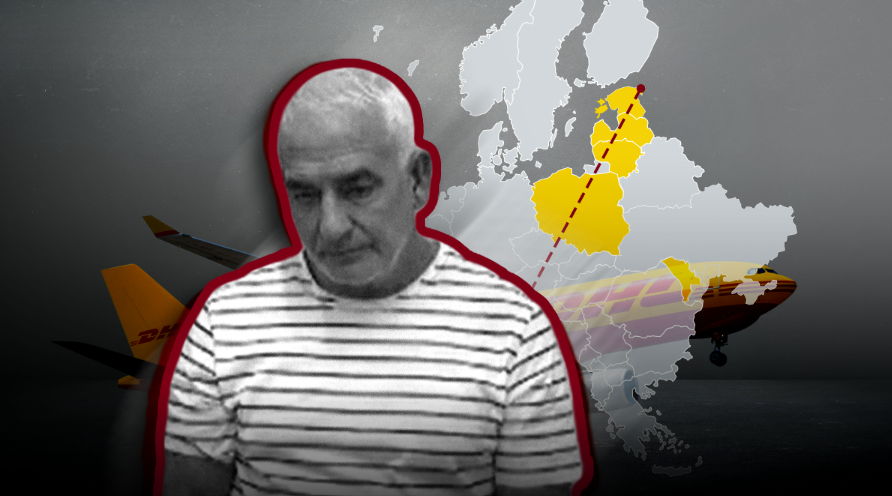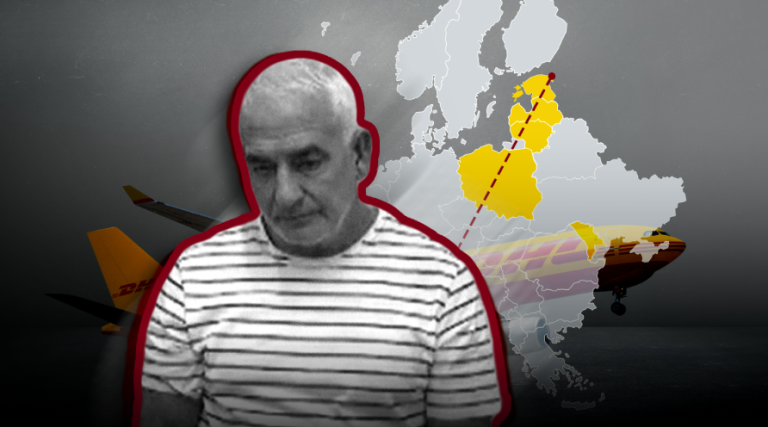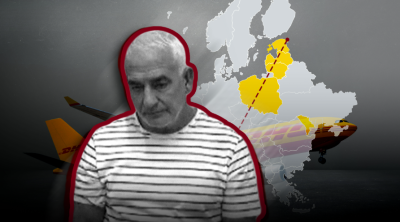Illustration: Delfi Estonia 2025-09-29
Illustration: Delfi Estonia 2025-09-29
Estonian authorities have detained two suspects linked to Russia’s GRU parcel bomb plot that shook Europe last year, when explosive devices hidden in packages sent from Estonia detonated in multiple countries. The arrests came just as our months-long media investigation into the operation was about to be published.
Two weeks ago, a consortium of six media outlets, including VSquare and Delfi, reported on how last year’s Europe-wide explosive parcel operation organized by Russia’s military intelligence, the GRU, began in Estonia (you can find a classic narrative version of the story here and a visualized investigation here). It was from Estonia that on June 24, 2024 a parcel containing massage pillows was sent out. Incendiary devices hidden inside these pillows later exploded in warehouses of international courier companies in Germany, England, and Poland. These explosions could have led to severe air disasters.
Immediately before the publication of the months-long investigation, Estonian internal security service KAPO detained two people in Estonia who, according to their suspicion, were connected to moving these parcels. On September 18, these people—life partners Eldar Salmanov and Gelena Gusseva—were put in custody by a decision of the Viru County Court.
Sixty-seven-year-old Salmanov, a Russian citizen, said in court that he was shocked by his detention and that he did not agree to pre-extradition detention. “Because I did not do what was written. I was in Estonia and this [suspicion] is completely absurd information,” Salmanov argued. He will likely be handed over to the Lithuanian authorities, who are leading the international criminal investigation.
The court did not allow Delfi to listen to the part of the arrest hearing where the charge was introduced to Salmanov and translated for him into Russian. Therefore, we do not know the full details of the allegation, but we know that Salmanov has been suspected in connection with the commission of terrorist crimes in Lithuania.
“I have not been to Lithuania even once in my life. I have been to Latvia once, six–seven years ago,” he said, adding that he did not even know he had been declared wanted in Lithuania. Salmanov being wanted was, of course, not public information that he could have known.
Knows Something About the Shipment
At the same time, Salmanov admitted to Delfi after the court session that the shipment related to the events was indeed sent by his partner, Gelena Gusseva.
The court discussed Gusseva’s arrest a couple of hours before Eldar’s detention on Thursday. The court did not allow the press to attend the discussion. Through her defense attorney, sworn advocate Andrei Matvejev, Gusseva stated that she did not wish to answer Delfi’s questions.
After his arrest hearing, Salmanov told Delfi that, last summer, an old business acquaintance from Russia contacted him and asked him to send a parcel to Latvia. According to him, the parcel was sent via Omniva by his partner in her own name and that she paid for it with her own credit card.
Salmanov did not wish to say who exactly that old business acquaintance was. He revealed only that he has known this acquaintance for about 10 years and that the person was in Russia at the time of contacting Salmanov. Delfi wrote last week that the person who received the parcel in Latvia and then drove it on to Vilnius in his car, Vassili Kovačs, was contacted by Andrei Baburov, a former Soviet and Russian Navy submarine officer who now works in the logistics business and lives in St. Petersburg.
Nor did Salmanov reveal how he got the parcel into his possession. He said he did not receive payment for the job. “It was only out of good will. If this is how it is, then I have been grossly used,” he said, adding that, if he had known about the plans related to the parcel, he could have sent it under someone else’s name or taken it there himself.
“It would have been much simpler and more guaranteed to take it by bus or car. There would have been no problem. Gelena sent the parcel in her own name—this is not, like, terrorist activity,” Salmanov remarked.
He told the court in fluent Russian that he has lived in Estonia for over 50 years. “I have worked here since 1982. I have nothing besides my house, I have nowhere to flee. And I am being charged with terrorism that I supposedly committed more than a year and three months ago. And they demand that I plead guilty to being a terrorist. This is ridiculous,” he said.
“I am well known in Narva-Jõesuu and in Estonia. Why should I then perform or carry out terrorist activity? I am a completely normal [person]. This is a shock to me.”
Salmanov is indeed a fairly well-known man in Ida-Virumaa. In the early 2000s, he made good money running the company Kesk Log & Eksped, which organized freight transport between the European Union and Russia. In addition, as a representative of both summer house and apartment associations, he has taken part in public life.
According to contemporary Russian-language media coverage, Salmanov’s firm provided the service of preparing Russian customs electronic pre-declarations for trucks moving from Estonia to Russia, which enabled much faster border crossings than before. In connection with this, Kesk Log also became the representative in Estonia of the Russian state enterprise Rostek (not to be confused with the Russian defense-industry company, Rostec.) According to Salmanov’s earlier statements in the 2000s, nearly half of the trucks crossing the border at Narva used his company’s service.
It is possible that it was precisely on the back of this business that Salmanov accumulated wealth that allowed him to buy apartments and a house in both Narva and Narva-Jõesuu. He owns a well-kept two-story house with a large yard in Narva-Jõesuu, as well as three apartments in Narva.
Among other things, Salmanov runs a joint business with Narva’s scandal-touched former mayor and influential municipal politician, the Centre Party member Vladimir Mižui, and with the transport entrepreneur Jüri Šehovtsov, who was a member of the Riigikogu in the early 2000s as a member of the Centre Party. Together the men run the company TN Logistic, which owns three properties in Narva, valued at over one million euros in total. At the same time, the company earns only 1,600 euros a year in sales revenue from renting out its properties.
Mižui was mayor of Narva from 1985 to 1993 and was one of the organizers of the unsuccessful referendum aimed at declaring Narva autonomous. In 2019, the Central Criminal Police detained Mižui for his activities as chairman of the supervisory board of AS Narva Vesi, suspecting him of taking bribes. Initially, nearly 10 officials were suspected, but the charge against Mižui and two other persons was later dropped.
Salmanov’s partner, Gelena Gusseva, also remanded in custody, works in Narva as a customer information specialist at the Transport Administration.
Salmanov himself says he is now retired. The operations of his logistics company, Kesk Log & Eksped, largely ceased in 2022, when Russia launched its full-scale invasion of Ukraine and doing business with Russia took a significant hit.
This original version of this article was published in Estonian on Delfi.ee.
Subscribe to Goulash, our original VSquare newsletter that delivers the best investigative journalism from Central Europe straight to your inbox!







